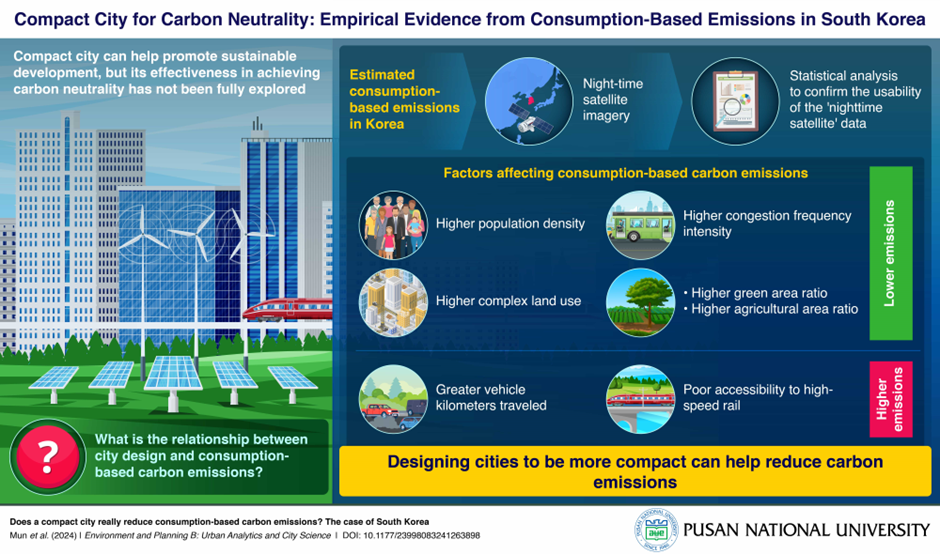
Pusan National University Researchers Highlight the Carbon-Saving Potential of Compact Cities
Study Finds Compact Cities Vital for Reducing Consumption-Based Carbon Emissions, Crucial for Sustainable Urban Growth
Compact cities are a cornerstone of smart growth strategies targeting carbon-neutral urban development. Past studies have performed analyses without distinguishing between production- and consumption-based carbon emissions. This new research focuses on consumption-generated emissions, revealing that compact cities—characterized by diverse land use, high population density, and robust public transit—significantly reduce carbon emissions. The study underscores the importance of compact city design in achieving urban carbon neutrality.

Image title: The role of city size in tackling the climate crisis
Image caption: Cities with high population density, diverse land use, and excellent public transit produce less consumption-based carbon emissions. They not only help combat climate change but also enhance urban living.
Image credit: Professor Juchul Jung from Pusan National University, Korea
License type: Original Content
Usage restrictions: Cannot be reused without permission
In recent years, the dramatic rise in extreme weather events due to climate change has escalated what was once termed "climate change" into a "climate crisis." With global average surface temperatures reaching unprecedented levels, the urgency to transition to a carbon-neutral society within the next decade or two is paramount to mitigate damage and safeguard our planet for future generations.
Cities play a crucial role in the transition to carbon neutrality. Due to each city's unique layout, industries, energy usage, and economic activities, carbon emissions can vary significantly. Effective strategies require understanding how emissions are distributed within cities. Current methods often rely on statistical data and global averages to measure production-based emissions, providing little insight into emission locations within cities and neglecting consumption-based emissions from goods and services. These consumption-based emissions are complex to measure and control due to their multifactorial nature.
To tackle this issue a group of researchers led by Professor Juchul Jung from Pusan National University conducted a study to examine how different urban forms affect carbon emissions. Their study, published on July 24, 2024 in Environment and Planning B: Urban Analytics and City Science, sheds light on the impact of compact cities on consumption-based carbon emissions. Using nighttime satellite imagery, the researchers estimated carbon emissions at a highly detailed level, focusing on consumption-based emissions at the pixel level and offering a more accurate picture of urban carbon footprints.
The study found that compact cities, characterized by high density, mixed land use, and efficient public transportation, produce significantly lower carbon emissions. “Contrary to what we might initially think, more compact cities encourage more environmentally friendly behaviors such as walking and the use of public transit, reducing reliance on cars and cutting down on overall travel distances,” says Prof. Jung. In contrast, sprawling cities with low-density developments and poor land use mix showed the highest carbon emissions, largely due to greater dependence on automobiles and longer travel distances.
Discussions around compact cities and their benefits have been ongoing for years. “Smart growth is an example of an urban planning theory that promotes compact development. It integrates elements such as housing, transportation, land use, and environmental health to create high-density, pedestrian-friendly communities that protect natural spaces and reduce the impacts of climate change,” adds Prof. Jung.
However, this theory contrasts with arguments suggesting that compact development may increase road congestion and emissions, prompting concerns about its efficiency. Distinguishing between production- and consumption-based carbon emissions provides a clearer understanding of how urban forms affect emissions. It supports the argument that compact city development is crucial for achieving carbon neutrality. Areas characterized by mixed-use developments, such as neighbourhoods in central Seoul and Busan, encourage walking and public transportation. This reduces reliance on cars and lowers overall emissions.
This study promises a future where compact city designs lead to sustainable urban living, with reduced infrastructure costs, lower energy consumption, improved air quality, increased physical activity, enhanced accessibility to amenities, shorter commutes, and an overall higher quality of life. By advocating for mixed-use neighborhoods, urban policies can pave the way for healthier, more efficient, and enjoyable city environments.
Reference
Title of original paper: Does a compact city really reduce consumption-based carbon emissions? The case of South Korea
Journal: Environment and Planning B: Urban Analytics and City Science
DOI: 10.1177/23998083241263898
About the institute
Pusan National University, located in Busan, South Korea, was founded in 1946, and is now the no. 1 national university of South Korea in research and educational competency. The multi-campus university also has other smaller campuses in Yangsan, Miryang, and Ami. The university prides itself on the principles of truth, freedom, and service, and has approximately 30,000 students, 1200 professors, and 750 faculty members. The university is composed of 14 colleges (schools) and one independent division, with 103 departments in all.
Website: https://www.pusan.ac.kr/eng/Main.do
About the author
Professor Juchul Jung is currently a professor in the Department of Urban Planning & Engineering at Pusan National University. He is conducting research on land use planning, environmental planning, carbon neutrality, and hazard mitigation planning, and serves as an advisory member of various organizations, including the Committee for Balanced National Development and the Ministry of Environment. He also received a commendation from the Minister of Science, ICT and Future Planning and a commendation from the Minister of the Interior and Safety.
Lab website: https://jcjung.pusan.ac.kr/jcjung/index.do
ORCID id: 0000-0003-2152-2345

 PURCS_126_Infographic_final.jpg
(2MB)
PURCS_126_Infographic_final.jpg
(2MB)